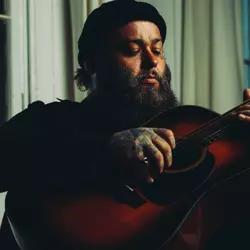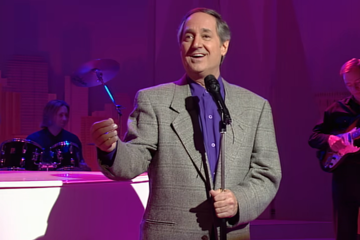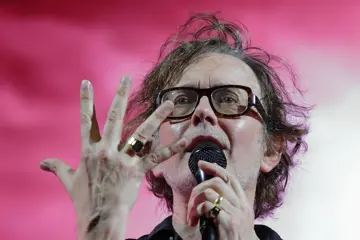 Dooms Children
Dooms ChildrenCONTENT WARNING: This article contains discussion of mental health. If you are suffering from any of the issues that have been discussed or need assistance, please contact Lifeline on 13 11 14 or Beyond Blue on 1300 22 4636.
Whether you know and adore him for his work in the heavy realms via his tenure with English punks Gallows or post-hardcore juggernauts Alexisonfire and beyond, Wade MacNeil is a seminal artist whose impact slips beyond the musical coil into film and video games alongside his band shenanigans.
A sharp and powerful vocalist and instrumentalist in his many creative hats, MacNeil is certainly no stranger to churning out releases and concocting sonic wizardry; but it's on his brand new project Dooms Children that the world is finally catching a glimpse into the man behind the spitfire vocals and razored riffs - and it's a stirring and, at times, confronting portrait as MacNeil unfurls his demons and presents his self-described most personal music yet.
Collaborating with co-producer Daniel Romano and instrumentalists Ian Romano and Patrick Bennett, the impending Dooms Children self-titled debut album strays far from the likes of Alexisonfire, Gallows and MacNeil's myriad of other projects, instead chronicling the arduous journey MacNeil himself faced while bringing the album to life. Half-written while battling mental health and addiction issues and completed while in rehab, Dooms Children is ultimately a pastiche of MacNeil's journey from destruction to hard-fought recovery, with a snapshot of people he has met along the way.
Don't miss a beat with our FREE daily newsletter
While ultimately an album very much borne from despair, the end result of Dooms Children is one of hope as MacNeil drops all his defenses and welcomes you into his world. And laced with psych-rock moments amongst other unexpected genre flourishes, the creation of Dooms Children defied many internal and external odds, as MacNeil explained on today's episode of The Green Room podcast.
"It's been really exciting," MacNeil told host Tiana Speter.
"I mean, as difficult as the last couple of years have been now for everyone...especially for how it's turned the music industry kind of upside down - the most positive aspects of it have been: I've recorded a lot of records.
"It was a time that being away from the road, I was able to...I don't know, have a really, really creative period of writing a ton of music with a lot of different people.
"The one piece of normalcy that we were all able to kind of have was going into the studio. The world is starting to slowly open up back again, and I'm gonna start putting some records out and play some shows. It's really, really exciting to be able to share all these songs with people."
For MacNeil, the journey to releasing Dooms Children saw a deep diversion stylistically and emotionally, with rock, blues and psychedelic moments lying in wait throughout alongside MacNeil's brutal honesty and direct lyricism. While the genre flavours may surprise many more familiar with MacNeil's punkier fare, there was entirely a method to the creative madness that led to the creation of Dooms Children.
"I think music...at the risk of sounding cliché, I think music can really save people's lives," MacNeil mused. "And I think it's saved mine a variety of times.
"Writing these songs and putting this together was, I think, a way for me to work through...a very, very difficult spot in my life. And then also to continue to work on the record as I, kind of, came out of the darker parts of that.
"I was, kind of, rebuilding things. When I was in a more sober and mentally healthy space is where I finished the record. And where I started the record was being very, very depressed...
"I feel like the parties had stopped a long time ago, but it had been more of a necessity of, like, getting through the day.
"I felt like things were falling apart around me, and I think there's some songs addressing that on [Dooms Children]. And then there's some songs, like, after I got clean and started finding some more hope again that are the, kind of, latter part of the album.
"For me personally, it's a very emotional thing to listen to, and I think it's gonna be a very emotional album to play. But I just wanted to be very open with it, and especially lyrically, I try to be very direct as well and not, kind of, hide things metaphorically or in a more poetic sense. I just brutally honestly came out with them.
"And I'm very glad I did, I think it was a very good experience for me. And I hope it's that very direct honesty that people can hopefully relate to and take away from it."
--------------
You can listen to the full episode with Wade MacNeil and host Tiana Speter below or here. Alternatively, you can also listen to full The Green Room podcast episodes below, as well as on Spotify, Apple Podcasts - or wherever you usually get your podcasts from.
--------------
Need more music, film, TV and comedy in your life? Check out all previous episodes of The Green Room here - and did you know you can also watch episodes of The Green Room too? Head here to check out some of the recent videos, and if you're still hunting for content to feed your ears, be sure to check out some of the other exciting Handshake Agency podcasts below!
- That Sucks! - fortnightly musings about the worst of your favourite things
- The Take With Willie Mason - join ex-Australian and NSW rugby league Willie Mason talking all things sports
- Rewind With Steve Bell - looking back on the classic albums that shaped the careers of Australian and international acts

















